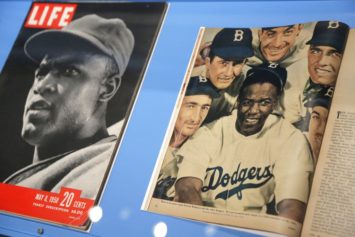I’m both excited and apprehensive about the upcoming Jackie Robinson biopic, 42.
I’m excited because any high-profile film and attendant discussion about the man Martin Luther King, Jr., called “a freedom rider before freedom rides” should be a positive. I’m excited because the film might stir people to read brilliant books like Jules Tygiel’s Baseball’s Great Experiment, Chris Lamb’s Blackout and Arnold Rampersand’s Jackie Robinson: A Biography.
I’m apprehensive because we know what Hollywood does to history. It’s not unlike what a monster truck does to a ferret: leaving it flattened and unrecognizable with all its sharp teeth knocked out. Historical movies about sports and the triumph over racism are often even worse. Films like Glory Road or Remember the Titans follow the s-i-c formula: segregation, integration, celebration.
In a biopic of the man who broke baseball’s color barrier, that formula would be particularly ironic since Jackie Robinson was doubting his own integrationist belief in the better angels of this country at the end of his life.
I will watch 42 with an open mind. However, here in advance are five aspects of Jackie Robinson’s tumultuous, politically complicated life story I fear won’t make the film’s final cut.
1. Branch Rickey was no saint. Based upon previews, it certainly appears that the hero of 42 will be not only Jackie Robinson, but Brooklyn Dodgers boss Branch Rickey played by Indiana Jones himself, Harrison Ford. Yet Rickey, while brave in bringing Robinson to the majors, hopefully will not be exempt from criticism. He is what Melissa Harris-Perry would call “an imperfect ally.”
Rickey was responsible for Robinson’s entry in the majors. He also bears a great deal of weight for the implosion of the Negro Leagues, after Robinson made his debut in 1947.
The Negro Leagues weren’t just a place of thwarted ambitions for the country’s best African-American players. They were also the largest national black-owned business in the country. Black owners, bookkeepers, trainers, coaches, and groundspeople were all part of what was a source of economic power, pride and self-sufficiency…
Read More: Dave Zirin, thenation.com


